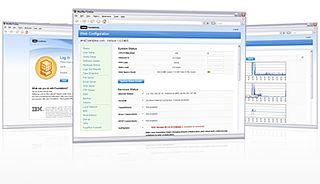Related Research Articles
IBM mainframes are large computer systems produced by IBM since 1952. During the 1960s and 1970s, IBM dominated the computer market with the 7000 series and the later System/360, followed by the System/370. Current mainframe computers in IBM's line of business computers are developments of the basic design of the System/360.

The point of sale (POS) or point of purchase (POP) is the time and place at which a retail transaction is completed. At the point of sale, the merchant calculates the amount owed by the customer, indicates that amount, may prepare an invoice for the customer, and indicates the options for the customer to make payment. It is also the point at which a customer makes a payment to the merchant in exchange for goods or after provision of a service. After receiving payment, the merchant may issue a receipt, as proof of transaction, which is usually printed but can also be dispensed with or sent electronically.
Nitix was a retail Linux distribution, produced in Canada. The software is developed by Net Integration Technologies, Inc., which has been acquired by IBM as of January 2008 and currently operates as IBM Lotus Foundations.

SUSE Linux Enterprise (SLE) is a Linux-based operating system developed by SUSE. It is available in two editions, suffixed with Server (SLES) for servers and mainframes, and Desktop (SLED) for workstations and desktop computers.

SUSE S.A. is a German multinational open-source software company that develops and sells Linux products to business customers. Founded in 1992, it was the first company to market Linux for enterprise. It is the developer of SUSE Linux Enterprise and the primary sponsor of the community-supported openSUSE Linux distribution project.

Wabi is a discontinued commercial software application from Sun Microsystems that implements the Windows Win16 API specification. Wabi runs applications developed for Windows 3.1, Windows 3.11, and Windows for Workgroups, interpreting and translating x86 instructions where appropriate, but without providing emulation support for DOS or PC hardware.
Squirrel Systems is a Burnaby-based point of sale vendor specializing in hospitality management systems. Squirrel is based in Burnaby, Canada.
IBM Lotus Expeditor is a software framework by IBM's Lotus Software division for the construction, integration, and deployment of "managed client applications", which are client applications that are deployed from, configured, and managed onto a desktop, usually by a remote server. The goal is to allow developers to create applications that take advantage of running on a local client, while having the same ease of maintenance as web-based applications.
4690 Operating System is a specially designed point of sale (POS) operating system, originally sold by IBM. In 2012, IBM sold its retail business, including this product, to Toshiba, which assumed support. 4690 is widely used by IBM and Toshiba retail customers to run retail systems which run their own applications and others.
FlexOS is a discontinued modular real-time multiuser multitasking operating system (RTOS) designed for computer-integrated manufacturing, laboratory, retail and financial markets. Developed by Digital Research's Flexible Automation Business Unit in Monterey, California, in 1985.

Lotus Foundations is a bundled small-business server solutions package by IBM. The package includes Lotus Domino, directory services, file management, firewall, backup, web hosting and various other productivity tools.

Linoma Software was a developer of secure managed file transfer and IBM i software solutions. The company was acquired by HelpSystems in June 2016. Mid-sized companies, large enterprises and government entities use Linoma's software products to protect sensitive data and comply with data security regulations such as PCI DSS, HIPAA/HITECH, SOX, GLBA and state privacy laws. Linoma's software runs on a variety of platforms including Windows, Linux, UNIX, IBM i, AIX, Solaris, HP-UX and Mac OS X.

The IBM 4610, also known as SureMark, is a thermal point-of-sale printer, originally developed and manufactured by IBM and currently offered by Toshiba Global Commerce Solutions, launched in 1996. It is used by major retailers such as Wal-Mart, Carrefour, Costco, Cencosud, Office Depot, Tesco, Best Buy, Chedraui, King Soopers, London Drugs and Soriana. It had replaced the famous IBM Printer Model 4. With the acquisition of IBM's Retail Store Solutions (RSS) business, the SureMark printers are now produced by Toshiba Global Commerce Solutions.
Linux on IBM Z or Linux on zSystems is the collective term for the Linux operating system compiled to run on IBM mainframes, especially IBM Z / IBM zSystems and IBM LinuxONE servers. Similar terms which imply the same meaning are Linux/390, Linux/390x, etc. The three Linux distributions certified for usage on the IBM Z hardware platform are Red Hat Enterprise Linux, SUSE Linux Enterprise Server, and Ubuntu.
SUSE Enterprise Storage (SES) is a Linux-based computer data storage product developed by SUSE and built on Ceph technology. The second major release was available in November, 2015, and announced at SUSECon 2015.

Windows Subsystem for Linux (WSL) is a feature of Microsoft Windows that allows developers to run a Linux environment without the need for a separate virtual machine or dual booting. There are two versions of WSL: WSL 1 and WSL 2. WSL is not available to all Windows 10 users by default. It can be installed either by joining the Windows Insider program or manually via Microsoft Store or Winget.

James Walter Melvin is an American entrepreneur, investor, and philanthropist who founded and served as the CEO of several notable software companies in the foodservice and hospitality industries. His software products have been installed at more than 125,000 stores worldwide for companies such as McDonald's, YUM! Brands, Burger King, Wendy's, Disney, Darden Restaurants, K-Mart, Costco, FedEx, Walmart, Foot Locker and many others.
References
- ↑ ""Why RSS"". Archived from the original on 2012-03-12. Retrieved 2011-11-08.
- ↑ "IBM is Helping Make Customer Checkout Easier, Faster, Smarter"
- ↑ "IRES"
- ↑ "IBM Retail Store Solutions cited for outstanding efforts in energy conservation"
- ↑ "Toshiba TEC to Acquire IBM’s Retail Store Point-of-Sale Solutions Business"
- ↑ "IBM Retail Environment for SUSE LINUX Version 2"
- ↑ "Ibm-Mid-Market-Software-Buying-and-Selling-Guide"
- ↑ "IBM Store Integration Framework"
- ↑ "With 360Commerce And IBM, Retailer's Choices Are Wide Open"
- ↑ "Triversity's Transactionware Enterprise Supports IBM Retail Environment for SuSE Linux"
- ↑ IBM IRES Sales Mastery [ dead link ]
- ↑ Supported POS Subsystem Versions